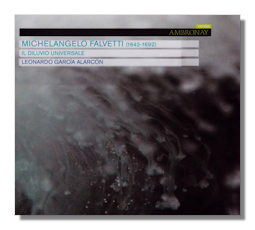
The Internet's Premier Classical Music Source
Related Links
- Latest Reviews
- More Reviews
-
By Composer
-
Collections
DVD & Blu-ray
Books
Concert Reviews
Articles/Interviews
Software
Audio
Search Amazon
Recommended Links
Site News
 CD Review
CD Review
Michelangelo Falvetti

Il Diluvio Universale
Cappella Mediterranea
Chœr de Chambre de Namur/Leonardo Garcia Alarcón
Ambronay AMY026
From the first "folk"-inspired accelerandi and light percussion strokes, the direct and plain (almost plaintive at times) declamatory language, and the imaginative instrumentation – with plucked strings, somnolent then contrastingly vigorous brass and highly colorful strings, this work announces itself as something a little unusual. Its performance, though, matches and exceeds any expectations that we may have of a Sicilian composer writing in the fourth quarter of the seventeenth century on an Old Testament myth for "five voices and five instruments".
Michelangelo Falvetti was born in 1642 in Palermo. Although he died in Sicily aged only 50 in 1692, he had what seems to have been an illustrious career in Messina, being appointed maestro di cappella at the cathedral there in 1682. He rose to prominence and garnered much respect for his musicianship in a wider sense as well as the composition of this small oratorio. Just a few minutes into listening to this idiomatic and creative account by Cappella Mediterranea, the Chœr de Chambre de Namur under Leonardo Garcia Alarcón on Ambronay (Il Diluvio Universale was performed at the Ambronay festival in 2010), one wishes that more of Falvetti's music were available, for this CD appears to be the only one in the current catalog.
It's appropriate that a composer of this obvious originality and drive should take the theme of The Flood for this important work… Messina, a port city ravaged both by earthquake and tidal wave, had recently rebelled against the Spanish monarchy, which inflicted harsh revenge. Life was not easy there.
Yet the text of Il Diluvio Universale (reproduced in full in Italian, English and French in the informative booklet that comes with this CD) is as detached as it is full of lament and horror… as Noah and his wife Rad foresee death in Dolce sposo [tr.10] there is real pathos. By the same token A Chi Mi Dà Aita [tr.21] is almost as anguished as anything Handel wrote. Yet there is restraint. There is a gentle naïveté in the simple progression of the narrative and transparent emotions expressed in short arias and soliloquies. And there is real coloring in the instrumental passages and accompaniment. Alarcón enlisted the support and input of Iranian percussionist, Keyvan Chemirani, in realizing the restoration. Although there are elements of improvisation and spontaneity as a result, they are neither out of place, nor excessive. Indeed, it's nice to remember that these reflect important currents in (contemporary) Sicilian (folk) music. But there's nothing "folksy" about this performance.
The singers have an edge, for sure. Their delivery is alive and immediate. But it's just as polished – as is the playing of the instrumentalists of the Cappella Mediterranea, one of whose explicit aims is to explore early aesthetic ideals and practices of southern Europe.
Alarcón has had to look beyond the only surviving printed libretto (by Vincenzo Giattini, who lived from 1630 to 1697) to establish the likely forces required for Il Diluvio Universale. He consulted the lists of musicians available to the Cathedral in Messina at the time. He has thus achieved a really vibrant, communicative and alert atmosphere. It lacks the stylized approach to the Flood which composers like Monteverdi, Scarlatti or Handel might have taken. This is due as much as anything to the moral component that cannot be ignored in the work: its principle characters include "Divine Justice", "Death", "Human Nature" and the four elements as well as Noah and Rad.
These are all sung with verve and excitement by soloists from the Chœr de Chambre de Namur, and completely in accordance with the emerging conventions of the (Italian) oratorio. Yet there is nothing either formulaic or static, prescribed or, indeed, truly familiar about the work or its performance here. Rather, the drama inherent in such a disaster is seen to drive the entire work, its impact on all affected – including God's repentance in the rainbow. The excitement, the pace, the novelty (in the best sense of the word) and the drive never let up in Falvetti's treatment. Correspondingly, the musicians led so ably by Alarcón are completely engaged in the music. The chorus in particular is given ample and extensive opportunities for both dramatic and reflective expression. The performance overplays nothing, nor misses any of the subtleties of Falvetti's inventiveness.
So if you enjoy the mid-Baroque generally, this excellently-recorded CD from Ambronay with a close but sympathetic acoustic marks new ground; it's well worth listening to. If you actively seek out the obscurer corners of the Italian Baroque, then you should not hesitate. Once you have heard Il Diluvio Universale a couple of times, those aspects of it which make it historically and musically unusual give way to an appreciation of a self-contained human drama well constructed and extremely sympathetically performed.
Copyright © 2012, Mark Sealey.





















